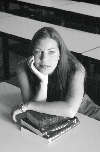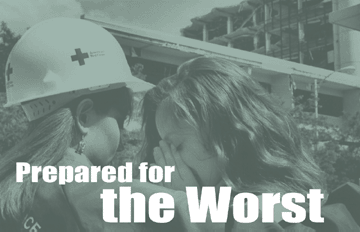
By Valerie Gregg
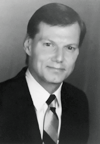
The
horror of (September 11)
was suddenly knowing that our sense of security wasn’t real... As
citizens of the world, nurses have been called to a new level of awareness,
and we must all respond.
—Tim Porter-O’Grady, affiliate
faculty member of nursing
and volunteer with the new
Georgia Nurse Alert System

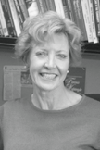
Most
people don’t realize that nurses have always played a very large
role in responding to disasters–probably because they are usually
wearing blue jeans, not white uniforms.
—Linda Spencer, clinical associate
professor of nursing and long-time
American Red Cross volunteer

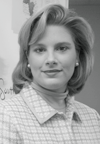
We
have learned how important it is to have accurate and timely information
coming from one source, in one united voice. With everything we learned
from
the tragic events of last fall, we will be better prepared for any disaster.
—Erin Poe Ferranti, 98N, 01MSN/MPH, assistant chief nurse
for the Office of Nursing,
Georgia Division of Public Health
There was no nursing
shortage in New York City on September 11. Nurses came to the scene of
the ruined twin towers at the World Trade Center by any means possible.
They hitched rides on garbage trucks, commandeered city buses, took boats,
trains, or walked—whatever it took. They stayed as long as necessary
and did what they could. One nurse volunteer described it as “the
darkest day of my life but the brightest moment of my nursing career.”
They showed up and set to work when and where they were needed because
that is what nurses do.
Making the most of so many capable helping hands during times of crisis
takes planning, practice, communication, and know-how. The faculty, students,
and alumni of the Nell Hodgson Woodruff School of Nursing are working
hard to make sure that Georgia and the nation are ready for the next disaster,
whether it happens to be a hurricane, explosion, or bioterrorist outbreak.
“Nurses are on the front lines of any emergency for triage and making
decisions about who goes where and who gets what,” says affiliate
faculty member Tim Porter-O’Grady, also president of the Georgia
Nurses Foundation. “Nurses are the gatekeepers, and they are indispensable.”
Linda Spencer, clinical
associate professor and director of the Public Health Nursing Leadership
Program, agrees. “Most people don’t realize that nurses have
always played a very large role in responding to disasters—probably
because they are usually wearing blue jeans, not white uniforms.”
Spencer has volunteered as an American Red Cross disaster response nurse
for more than 12 years, working hurricanes, house fires, explosions, tornadoes,
and floods. She has received the Florence Nightingale Medal, the highest
award of the International Committee of the Red Cross, and has trained
hundreds of nurses in the Red Cross system of disaster response and management.
Although she was unable to join the Red Cross effort in New York City
last fall, on April 19, 1995, she raced to the scene of another terrorist
attack—Oklahoma City—after a massive bomb destroyed the nine-story
Murrah Federal Building. As the bodies of 168 men, women, and children
were pulled from the rubble, Spencer made condolence calls to the families
of victims.
“I served as the nurse on a Red Cross condolence team that also included
a mental health worker and a social worker,” she says. “Families
were affected in ways that were different from the more typical natural
disasters. In Oklahoma City, homes weren’t destroyed, but family
breadwinners had died. We saw reactions ranging from shattering, gut-wrenching
grief to utter denial. At one home we visited, the wife of a victim was
floating around the room, serving food and chatting with visitors, being
a social butterfly. She was in total denial. She had not faced the fact
that her husband was dead.”
Meeting the needs of victims, especially during an incident causing mass
casualties, requires an orchestrated response in which all volunteers
arrive and know just what to do. Red Cross volunteer nurses must be certified
in disaster response, which requires 11 hours of classes, and only LPNs
and RNs are eligible. Spencer recently taught a free Red Cross disaster
response certification course at the School of Nursing. About 20 nursing
students, faculty, and nurses from the community attended.
“The certification is so important because all the volunteers must
be on the same page about what to do when they arrive on the scene of
a disaster,” says Spencer. “Because the Red Cross response system
is so standardized—it always proceeds in basically the same manner—it
is a very organized and smooth-running process. It’s truly amazing
to watch the set-up of a disaster response site. It’s like choreography.
Everyone knows just what to do during an intense, high-pressure, stressful
time.”
On high alert
For Porter-O’Grady, who teaches leadership, health care economics,
and futures issues at the school, September 11 made him view the world,
the nation, and his nursing career through a different lens.
“We had lived for so long with the feeling that we were under a magical
halo of protection,” he says. “The horror of it was suddenly
knowing that our sense of security wasn’t real. We had been living
a myth, and now we can no longer live under that mythology. As citizens
of the world, nurses have been called to a new level of awareness, and
we must all respond.”
Soon after September 11, Porter-O’Grady helped organize the Georgia
Nurse Alert System, a list of nurses for state public health officials
to call on during times of crisis. The effort brought together a wide
variety of state nursing groups—including the Georgia Nurses Association,
the Georgia Nurses Foundation, the state Department of Human Resources,
the Board of Nursing, and the American Red Cross.
About 200 nurses have signed on so far, including Porter-O’Grady.
The list categorizes nurses by specialty, and his expertise is gerontology
with a focus on wound care.
“Each of us has our own gifts and skills to offer, and it will take
all of us working together to prepare,” he says. “As nurses,
it is our professional obligation to be available and lend our skills.”
Erin Poe Ferranti, 98N, 01MSN/MPH, assistant chief nurse for the Office
of Nursing in the Georgia Division of Public Health, says the best thing
nurses can do to help during times of crisis is to volunteer their services
now—not after a disaster occurs. Georgia was the first state to establish
a volunteer source like the Georgia Nurse Alert System. But then Georgia
is better prepared to respond to disaster than most other states. Before
hosting the 1996 Summer Olympics in Atlanta, the state made contingency
plans for virtually every type of disaster. Nurses figure heavily in almost
every scenario.
“During any emergency, it is essential to have highly skilled nurses
available to respond, especially where special-needs populations are concerned,”
says Ferranti. “The Office of Nursing is now writing a manual to
set common procedures in caring for displaced and evacuated populations
in a shelter or mass holding site.”
Powerful lessons
Ferranti has seen nurses and the entire nation go through some hard lessons
about effective disaster management. She began her job in the Office of
Nursing on October 16, just as the anthrax epidemic hit.
“Anthrax scares were overwhelming our local public health departments,”
she says. “The majority of the scares posed no credible threat, and
the greatest issue was figuring out what to do with all the samples of
white powder suspected of containing anthrax. The panic associated with
the situation overwhelmed the staff as well. We were not prepared to answer
all the phone calls. Nationally, there was a lot of information coming
through the pipes, and it was constantly being updated and changed. Local
health departments needed clear direction about what to do. From all of
this, we have learned how important it is to have accurate, timely information
coming from one source, in one united voice. With everything we learned
from the tragic events of last fall, we will be better prepared for any
disaster.”
Alumni involvement in preparing for disasters doesn’t stop there.
Dr. Judith Lupo Wold, 81MN, a visiting scholar at the School of Nursing,
represents Emory in an organization called the International Nursing Coalition
for Mass Casualty Education (INCMCE), of which the nursing school is a
formal member. Organized by Vanderbilt University School of Nursing, the
group has more than 50 members from universities, agencies, and organizations
who have worked for nearly two years to develop bioterrorism and disaster
training curricula for nurses. INCMCE also provides an Internet information
clearinghouse (see below) for nurses on disaster prevention and response.
Valerie Gregg is assistant director of Health Sciences Publications
at Emory University.
To
learn more about disaster response nursing,
visit the following websites:
www.georgianurses.org
www.redcrossatlanta.org
www.mc.vanderbilt.edu/nursing/coalitions/INCMCE/
